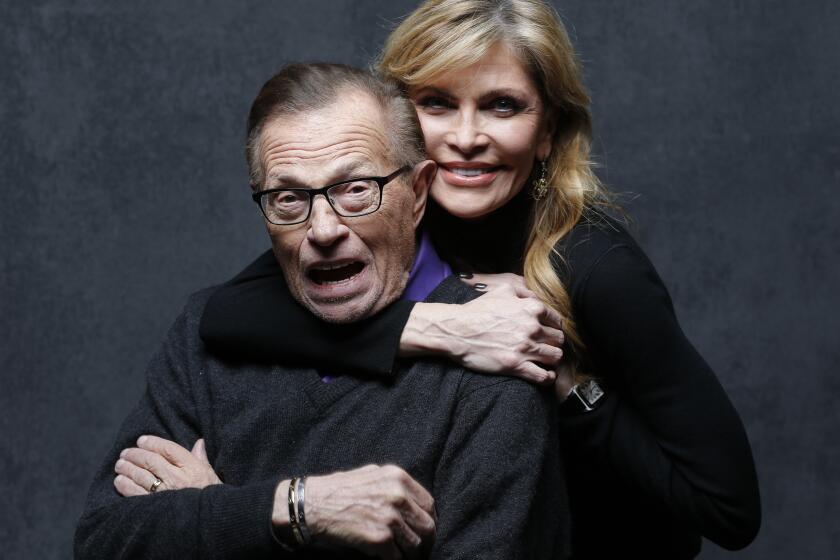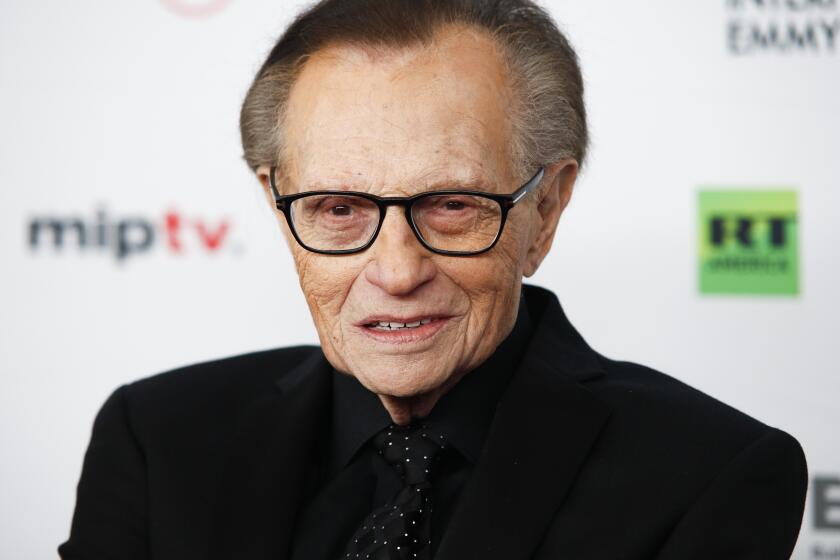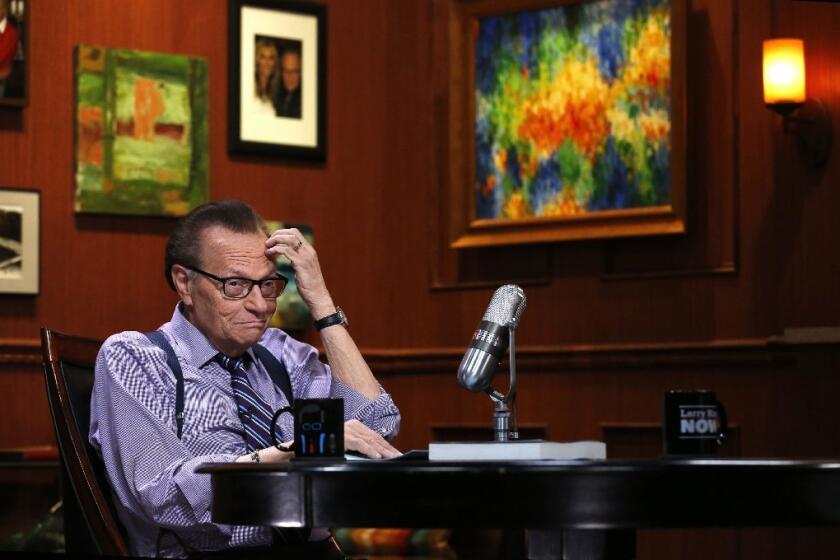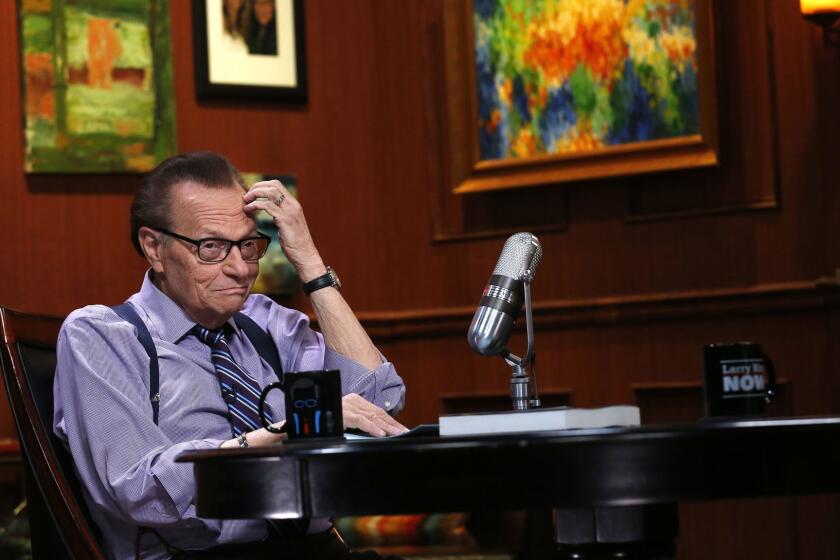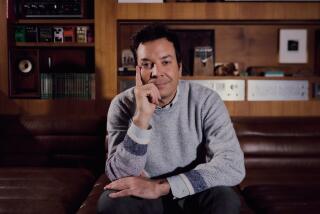Larry King, legendary talk show host, dies at 87

Larry King, who gained fame with his CNN show “Larry King Live,” died Saturday in Los Angeles. King was hospitalized with COVID-19 earlier this month.
- Share via
In living rooms across America, Larry King was as comfortable a guest as a favorite uncle dropping by to schmooze with the family.
Never too pushy, never going directly for the jugular, King — with his trademark suspenders, horn-rimmed glasses and rolled-up sleeves — would chat it up with presidents, authors, actors, psychics, villains, heroes or anyone with a product to push, a political race to win or an image in need of a makeover.
In a career that spanned half a century, King became one of the most famous talk show hosts and opinion shapers in the world with his breezy, rarely confrontational style of banter, leading his guests this way and that, wherever his curiosity took him.
Larry King, one of the most famous talk show hosts and opinion shapers in the world, died Saturday in Los Angeles after being hospitalized with COVID-19.
Seldom out of the spotlight for long, the 87-year-old King died Saturday at Cedars-Sinai Medical Center, said Ora Media, the company behind the programs “Larry King Now” and “Politicking With Larry King,” in a statement. King was hospitalized with COVID-19 earlier this month.
King ended his long-running CNN program in 2010 but returned to television again and again as a moderator and, occasionally, pitchman. During his 25 years presiding over “Larry King Live,” the first international live phone-in TV talk show, King was variously dubbed in the press “America’s yak-master,” the “pope of talk” and the “top banana of talk-show hosts.”
With his swept-back dark hair, the jacketless King would sit at his desk with its prop antique microphone and — leaning forward, shoulders hunched — do what he felt he did best: “draw people out in an interview.”
“Tonight!” he’d boom in his familiar baritone at the start of each show, launching into a brief introduction of the evening’s guest — or guests — seated opposite him or in another studio via satellite.
Appreciation: It was Larry King’s gift and job to be curious. It made him a memorable interviewer — and a larger-than-life figure in his own right.
For King, that could mean Frank Sinatra or Henry Kissinger, Don Rickles or the Dalai Lama.
Over the decades, a seemingly endless succession of celebrities, politicians and assorted newsmakers and experts dutifully answered King’s questions.
It was a simple formula: King and his guest would talk at length, then King would take phone calls from viewers.
“Bethesda, Maryland, hello!” he’d say after punching one of the blinking lines on his desktop phone.
Launched on CNN in June 1985 with then-New York Gov. Mario Cuomo as the first guest, “Larry King Live” became CNN’s highest-rated show, and King became a household name.
But it was the 1992 presidential campaign that elevated King and his show to a new level.
It began with an appearance in February by Ross Perot in which the Texas billionaire, after prodding from King, said that if “everyday folks” put his name on all 50 state ballots he would agree to run as an independent candidate for president.
The headline-generating appearance by Perot made King a major force in the political world and turned “Larry King Live” into a mandatory pit stop for politicians.
That year, more than a dozen presidential candidates faced King’s cameras.
For King, the 1992 presidential campaign, in the words of the Los Angeles Times’ then-television critic Howard Rosenberg, “gold-plated him as an American institution.”
In 1993, King moderated a 90-minute debate on the controversial North American Free Trade Agreement between Vice President Al Gore and Perot that, according to CNN, drew the highest rating in its history at the time, with more than 16.3 million viewers.
Washingtonian magazine dubbed King the country’s most influential media personality.
But along with his success came criticism — for fawning over celebrities, for asking “softball questions” and, when interviewing politicians, for not asking tough follow-up questions, thus letting them get away with evasive answers.
“King couldn’t find his way to the jugular even with a compass, track dogs and body map,” Rosenberg, one of King’s harshest critics, wrote in 1995.
For his part, King readily acknowledged that he was not a journalist. As a talk show host, he preferred the term “infotainer” — offering up a hybrid of information and entertainment.
Asked to explain his success as a talk show host, King told the Fort Lauderdale Sun-Sentinel in 1996 it was “because I’m sincere. I’m really curious. I care what people think. I listen to answers and leave my ego at the door. I don’t use the word ‘I,’ which is irrelevant in an interview. It has no place other than showing off.”
As Cuomo once said of King: “He has the ability to ask the questions you would ask in your living room.”
And, in taking that approach, King’s questions often elicited revealing, sometimes surprising responses.
He once asked violin virtuoso Jascha Heifetz, “Jascha, why the violin?”
Replied Heifetz: “My mother made me.”
And there was this exchange during King’s 1992 interview in Washington with former President Nixon:
King: “Mr. President, finally, is it hard to come back to this city? Is it hard to drive by the Watergate?”
Nixon: “Well, I’ve never been in the Watergate, so it’s not hard for me.”
King: “Never been in? Never been in the restaurant?”
Nixon: “No, no, no. Other people were in there, though, unfortunately.”
When Mikhail Gorbachev was asked why he appeared on King’s show, the former Soviet leader reportedly replied through an interpreter: “First, because it’s Larry and second because it’s live. I know America watches him.”
King’s announcement in June 2010 that he would leave his program later in the year came in the wake of a sharp decline in viewership for his show and his reconciliation with his seventh wife, Shawn, after they both filed for divorce. They again filed for divorce in 2019.
In announcing his pending departure, the 76-year-old King told his viewers that it would give him more time to spend with his wife and attend his children’s Little League games but that he would be back on CNN to host a number of specials.
“I’m incredibly proud that we recently made the Guinness Book of World Records for having the longest-running show with the same host in the same time slot,” he told viewers.
King, who came across as just a “regular guy” from Brooklyn who was prone to saying “gonna” and “ain’t,” was an unlikely TV star.
In addition to hosting “The Larry King Show,” a late-night radio talk show on the Mutual Broadcasting System from 1978-94, King was the author of a number of bestselling books, wrote a longtime weekly column of random thoughts for USA Today, made more than 20 cameo appearances in movies and, in the midst of the pandemic in 2020, launched an hourlong pop culture podcast.
No one was more surprised by his success than King.
“For this to all happen to a Jewish kid from Brooklyn,” he told the London Guardian in 1994, “is a damn impressive thing.”
King was born Lawrence Harvey Zeiger in Brooklyn, N.Y., on Nov. 19, 1933. His parents owned a bar and grill there, but King’s father sold the business after the outbreak of World War II and went to work in a defense plant in New Jersey to help the war effort.
In 1944, when King was 10, his father died of a heart attack and King’s mother went on welfare before taking a job as a seamstress in Manhattan’s garment district to support King and his younger brother, Martin.
His father’s death had a profound effect on King. He began neglecting his studies and by junior high school was labeled a troublemaker. His grades remained poor in high school, and he barely managed to graduate in 1951.
King was once asked by a Washington Post reporter, “Who is Larry King?”
“All the things that Larry Zeiger never was,” he replied.
Although King dreamed of becoming a radio broadcaster while growing up, he spent the initial years after high school working a variety of odd jobs. But in 1957, after hearing that Miami was a good place to break into radio, the 23-year-old King headed to Florida.
The only job he could find was sweeping floors at a small AM station, WAHR, with the promise of an on-air job when someone quit. When the morning disc jockey quit two weeks later, the general manager asked King to step in. Half an hour before going on the air, King recalled, the general manager told him that Zeiger sounded “too German, too Jewish” and suggested the name King.
In 1958, King moved to a larger radio station, WKAT, and the increasingly popular disc jockey began hosting a four-hour radio show on location at Pumpernik’s, a popular Miami restaurant, where he quickly progressed from interviewing the restaurant’s customers to talking with celebrities such as Lenny Bruce, Bobby Darin and Ella Fitzgerald.
In 1960, King also began hosting a Sunday night interview show for a local TV station. Two years later, he was hired by Miami radio station WIOD and began doing an interview show from the houseboat that had been used on the TV private-detective series “Surfside 6.”
His local popularity was further fueled when he became the color commentator for the Miami Dolphins’ football broadcasts on WIOD and began writing local newspaper columns.
King began living large in the 1960s. But despite impressively earning nearly $70,000 a year by 1966, he found himself deeply in debt, thanks to spending lavishly and betting on horse races.
“At my most egotistical moments, of which there were many, I felt as if I owned Miami — and I lived as if I did, too,” he wrote in “Larry King by Larry King,” his 1982 autobiography. “I felt that whatever Larry King wanted Larry King should have. And I wanted the best.”
The years of overspending, along with his heavy gambling debts, caused King to begin lying to his friends so he could borrow money from them.
In 1971, King was arrested after financier Louis Wolfson, with whom King had dealings, pressed grand larceny charges against him. A judge dismissed the charges because the statute of limitations had expired, but the scandal shattered King’s career.
He lost his local radio show, his sideline as the color man for the Miami Dolphins, his television show and his newspaper column.
Unable to get a steady job and still deeply in debt, King spent the next few years working as a freelance writer and broadcaster and doing public relations for a horse-racing track in Shreveport, La.
But the turnaround for King began in 1975 when WIOD radio, under a new general manager, decided to give him another chance.
In 1978, the same year he declared bankruptcy, King’s career took a giant leap when the Mutual Broadcasting System offered him the opportunity to host a national late-night call-in radio show.
“The Larry King Show,” originally broadcast from Miami before moving to the Mutual studios in Arlington, Va., debuted in 1978 on 28 stations. By the early ’80s, the show was being carried on nearly 250 Mutual affiliates in all 50 states and had won a Peabody Award.
In 1983, King made an attempt at a national TV talk show — a 90-minute syndicated program on 118 stations. It failed. But then, in 1985, came CNN and “Larry King Live.”
Once ranked as the leader in cable TV news, King’s show was third in his time slot in 2010 — from a reported peak of 1.64 million in 1998 to an average of 700,000.
But when he ended his 25-year run of “Larry King Live” on Dec. 16, 2010, an estimated 2.24 million people tuned in to watch the 77-year-old talk show host, who wore red suspenders and a red-and-white polka dot tie for the occasion.
“It’s not very often in my life that I’ve been without words,” he said at the close of the show. “I never thought it would last this long or come to this.”
Survivors include three children, nine grandchildren and four great-grandchildren. He was predeceased by a son and a daughter who died within a week of each other last year.
McLellan is a former Times staff writer.
More to Read
Start your day right
Sign up for Essential California for the L.A. Times biggest news, features and recommendations in your inbox six days a week.
You may occasionally receive promotional content from the Los Angeles Times.
